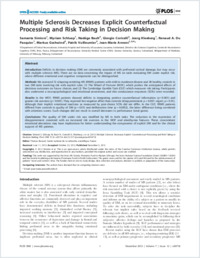Multiple sclerosis decreases explicit counterfactual processing and risk taking in decision making
- Simioni, Samanta Department of Clinical Neurosciences, University Hospital and University of Lausanne, Switzerland
- Schluep, Myriam Department of Clinical Neurosciences, University Hospital and University of Lausanne, Switzerland
- Bault, Nadège Institut des Sciences Cognitives, Centre de Neuroscience Cognitive, CNRS, Bron, France
- Coricelli, Giorgio Institut des Sciences Cognitives, Centre de Neuroscience Cognitive, CNRS, Bron, France
- Kleeberg, Joerg Department of Clinical Neurosciences, University Hospital and University of Lausanne, Switzerland
- Pasquier, Renaud A. Du Department of Clinical Neurosciences, University Hospital and University of Lausanne, Switzerland
- Gschwind, Markus Department of Neuroscience, University Medical Center (CMU), Geneva University, Geneva, Switzerland
- Vuilleumier, Patrik Department of Neuroscience, University Medical Center (CMU), Geneva University, Geneva, Switzerland
- Annoni, Jean-Marie Department of Medicine, University of Fribourg, Fribourg, Switzerland - Department of Neuroscience, University Medical Center (CMU), Geneva University, Geneva, Switzerland - Department of Clinical Neurosciences, University Hospital and University of Lausanne, Switzerland
-
12.05.2012
Published in:
- PLoS ONE. - 2012, vol. 7, no. 12, p. e50718
English
Deficits in decision making (DM) are commonly associated with prefrontal cortical damage, but may occur with multiple sclerosis (MS). There are no data concerning the impact of MS on tasks evaluating DM under explicit risk, where different emotional and cognitive components can be distinguished.Methods: We assessed 72 relapsing-remitting MS (RRMS) patients with mild to moderate disease and 38 healthy controls in two DM tasks involving risk with explicit rules: (1) The Wheel of Fortune (WOF), which probes the anticipated affects of decisions outcomes on future choices; and (2) The Cambridge Gamble Task (CGT) which measures risk taking. Participants also underwent a neuropsychological and emotional assessment, and skin conductance responses (SCRs) were recorded.Results: In the WOF, RRMS patients showed deficits in integrating positive counterfactual information (p <0.005) and greater risk aversion (p <0.001). They reported less negative affect than controls (disappointment: p = 0.007; regret: p = 0.01), although their implicit emotional reactions as measured by post-choice SCRs did not differ. In the CGT, RRMS patients differed from controls in quality of DM (p = 0.01) and deliberation time (p = 0.0002), the latter difference being correlated with attention scores. Such changes did not result in overall decreases in performance (total gains).Conclusions: The quality of DM under risk was modified by MS in both tasks. The reduction in the expression of disappointment coexisted with an increased risk aversion in the WOF and alexithymia features. These concomitant emotional alterations may have implications for better understanding the components of explicit DM and for the clinical support of MS patients.
- Faculty
- Faculté des sciences et de médecine
- Department
- Médecine 3ème année
- Language
-
- English
- Classification
- Biological sciences
- License
-
License undefined
- Identifiers
-
- RERO DOC 31003
- DOI 10.1371/journal.pone.0050718
- Persistent URL
- https://folia.unifr.ch/unifr/documents/302744
Statistics
Document views: 111
File downloads:
- pdf: 152
